Ecology
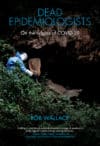
The COVID-19 pandemic shocked the world. It shouldn’t have. Since this century’s turn, epidemiologists have warned of new infectious diseases. Indeed, H1N1, H7N9, SARS, MERS, Ebola Makona, Zika, and a variety of lesser viruses have emerged almost annually. But what of the epidemiologists themselves? Some bravely descended into the caves where bat species hosted coronaviruses, including the strains that evolved into the COVID-19 virus. Yet, despite their own warnings, many of the researchers appear unable to understand the true nature of the disease—as if they are dead to what they’ve seen. Dead Epidemiologists is an eclectic collection of commentaries, articles, and interviews revealing the hidden-in-plain-sight truth behind the pandemic: Global capital drove the deforestation and development that exposed us to new pathogens. | more…

Survival Bricolage of Zhoujiazhuang and Puhan Rural Community
Zhoujiazhuang and the Puhan Rural Community offer contrasting experiences of how communities in different parts of China have responded to, negotiated, and undergone extensive changes during the last forty years since the reform policy was implemented in the country in 1979. | more…

The Singularity of the Zhoujiazhuang People's Commune
Zhoujiazhuang is singular, being the only de facto people’s commune in China today. At present, Zhoujiazhuang still maintains the political, economic, and social structure that has been essentially in place since 1956. For over sixty years—since ten years before the Cultural Revolution and thirty-eight years after the dismantling of almost all people’s communes in 1982—Zhoujiazhuang has survived as an organizational unit over the same territory comprising the same six natural villages. | more…
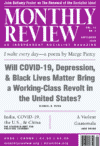
Climate change is just one part of a larger planetary emergency related to the crossing of planetary boundaries due to the system of capital accumulation. New diseases that can be transferred from animals to humans such as COVID-19 are another part. Knowledge of the overall planetary emergency in which the world is immersed, and its relation to capitalism, is thus crucial to our time. | more…

Toward a General Strike for Abolition
Poultry-processing work lies within a larger web of carceral geographies that extend beyond the prison walls into factory floors, neighborhoods, and schools. These geographies depend on and are produced through racism, as the production of unequal vulnerability to premature death. Racial capitalism connects the poultry plant to the prison alongside the movement for abolition beyond the prison. | more…

COVID-19 is a great revealer, laying bare the structures of racial disposability that have sacrificed people, from migrant detainees to meat packers. We are also witness to the rise of anti-Asian violence. Brutal attacks against Asian Americans have exposed the fraudulence of the model minority myth and the assimilationist paradigm that legitimizes state violence against Black and Brown bodies. | more…
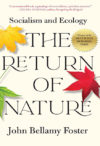
Twenty years ago, John Bellamy Foster’s Marx’s Ecology: Materialism and Nature introduced a new understanding of Karl Marx’s revolutionary ecological materialism. More than simply a study of Marx, it commenced an intellectual and social history, encompassing thinkers from Epicurus to Darwin, who developed materialist and ecological ideas. Now, with The Return of Nature: Socialism and Ecology, Foster continues this narrative. In so doing, he uncovers a long history of efforts to unite issues of social justice and environmental sustainability that will help us comprehend and counter today’s unprecedented planetary emergencies. | more…
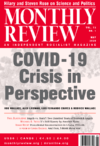
In its wider economic, ecological, epidemiological, and public health context, the current COVID-19 pandemic demonstrates the enormous dangers of the metabolic rift in human ecology and epidemiology brought on by capitalist social relations in the age of monopoly-finance capital, global agribusiness, and intricate, globe-spanning supply chains associated with the extreme exploitation and expropriation of both human beings and nature. Neoliberalism, representing the inner logic of capitalism, has left the world vulnerable to catastrophe wherever it has come into play. | more…

COVID-19, the illness caused by coronavirus SARS-CoV-2, the second severe acute respiratory syndrome virus since 2002, is now officially a pandemic. As of late March, whole cities are sheltered in place and, one by one, hospitals are lighting up in medical gridlock brought about by surges in patients. | more…

Hilary Rose, a sociologist, and Steven Rose, a neuroscientist, were two of the principal founders of the British Society for Social Responsibility in Science in the late 1960s in London. They speak about their work as scientists and antiwar activists, particularly around the issue of Palestinian liberation. | more…

Karl Marx’s (and Frederick Engels’s) analysis of nineteenth-century Irish history revealed what is referred to as “the rift of Éire” in the colonial period. Indeed, it is in relation to the analysis of the systematic disruption of the Irish environment that Marx’s ecological inquiries can be seen as taking on a concrete and developed form, encompassing the ecological as well as economic robbery that characterized the Irish colonial regime. | more…
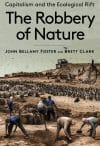
In the nineteenth century, Karl Marx, inspired by the German chemist Justus von Liebig, argued that capitalism’s relation to its natural environment was that of a robbery system, leading to an irreparable rift in the metabolism between humanity and nature. In the twenty-first century, these classical insights into capitalism’s degradation of the earth have become the basis of extraordinary advances in critical theory and practice associated with contemporary ecosocialism. In The Robbery of Nature, John Bellamy Foster and Brett Clark, working within this historical tradition, examine capitalism’s plundering of nature via commodity production, and how it has led to the current anthropogenic rift in the Earth System. | more…











